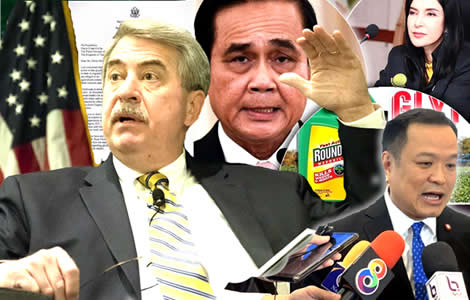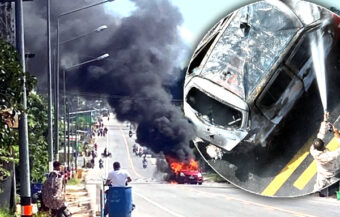A series of letters have emerged detailing a vigorous and comprehensive campaign by the US Department of Agriculture and embassy officials to alert the Thai government to the implications of the ban on farming chemicals confirmed this week. The letters were sent to all key ministers in the government including the prime minister on Friday last, October 18th. Despite this, the ban was approved by the National Committee on Hazardous Substances on Tuesday the 22nd October ahead of an earlier reported meeting date of the 27th October.
This week’s momentous decision by a key committee of the Thai government to ban widely used chemicals and pesticides in the farming sector from December 1st looks like it has run into stronger opposition. This time it’s not just from Thai farmer’s groups but from US authorities who wrote to the Thai government on Friday, October 18th asking that the decision be delayed until the committee could be apprised of the full breadth of scientific facts of the issue. It also warned of severe economic consequences resulting from the ban going ahead.

On Tuesday the 22nd, a meeting of the National Committee on Hazardous Substances convened and confirmed the ban on controversial chemicals and pesticides used extensively in Thailand’s agricultural industry under pressure from a concerted campaign driven by Thailand’s Bhumjaithai party, a key and powerful coalition partner.
The meeting was originally reported as scheduled for October 27th. The ban was approved in the face of dire predictions by farmer’s representatives who have warned that they will seek legal relief and bring the matter to Thailand’s Administrative Court.
Bhumhaithai leader and Public Health Minister has threatened to resign if the ban is not enforced
Earlier in October, the Thai Public Health Minister and Bhumjaithai leader Anutin Charnvirakul had threatened to resign if the measure was not agreed and his party colleague, the junior minister at the Ministry of Agriculture, Mananya Thaiseth even suggested that the committee members should leave Thailand if the proposed ban was not given the committee’s imprimatur: ‘We must ask whether they are Thai people or not. As they are still in Thailand, they must respond to the voice of the people. If not, they are not Thais and should leave the country,’ she told reporters when asked about the issue before the key vote.
Farmers have consistently warned of hardship and huge economic costs associated with the ban
Farmer representative bodies have repeatedly warned of the severe impact the ban will have on their operations and the price of their crops. The Chairman of the Sugarcane Farmers Association, Mr Thongkam Cheongklad predicts that the whole industry faces a ฿570 billion bill for the measure while respected agricultural expert Kitti Choonhawong, President of the Thailand Society of Sugarcane Technologists, put the loss for sugar cane growers alone at ฿96 billion.
Letters from the US government and embassy emerged on Friday that were sent a week earlier
On Friday, a letter published in Bangkok addressed to Thailand’s Industry Minister Suriya Juangroongruangkit from the US embassy and dated the 18th October details strong representations made to the Thai government on the matter pointing to the significant economic impacts of the move. The ban, it appears, has also gotten the attention of senior officials of the US administration in Washington DC.
An accompanying letter from the Under Secretary of Agriculture for Trade and Foreign Agricultural Affairs to Prime Minister Prayut Chan ocha requested that any decision by the committee on the issue be postponed until its members had been apprised of the facts from America’s own Environment Protection Agency and a range of other national and international agencies including the UN.
US Under Secretary for Agriculture said the chemicals posed ‘no meaningful risk to human health’
The letter from Mr Ted McKinney went on to assure that prime minister that the chemicals were safe according to international studies conducted in the US, Europe, Japan and Australia. The senior US official drew the PM’s attention to a report from the EPA in December 2017 which concluded that the products including Glyphosate, one of the world’s most used chemicals by farmers, posed ‘no meaningful risk to human health’ when used properly.
Mr McKinney went on to invite the prime minister and his team to Washington to learn more about the products from US officials and scientists.
Letters sent to Foreign Affairs Minister by diplomatic channels and all government ministers
It is understood that the letter was sent to Thailand’s Department of Foreign Affairs with copies sent to all key ministers in the Thai government involved in the decision-making process.
The second letter from Mr Russ Nicely, the Agricultural Counsellor at the US embassy in Bangkok gave a summary of the likely impact of the ban both on Thailand’s farmers and the economy as well as that of the United States.
Huge costs to Thai farmers, business and US farmers linked with the ban when it is in force
He predicted that a cost to Thai farmers will be between ฿75 billion and ฿125 billion if they can find a suitable but more expensive replacement range of chemicals to allow them to grow crops.
He said that if no suitable chemicals can be found, Thai farmers will have to have recourse to weeding by hand which will involve extensive additional labour costs. He predicted this would land farmers with a bill of ฿128 billion.
In the short term, the US envoy warned that the ban would impact American imports into Thailand including wheat, soybean, coffee, apples and grapes with a total value of $1.7 billion.
There would also be an impact on many Thai manufacturing concerns who use American imports with a total economic loss to those businesses estimated at ฿40 billion.
Ban to become effective on December 1st
The ban on the chemicals approved by the government committee on Tuesday comes into effect on December 1st. We have not yet had any economic predictions as to its secondary or knock-on impacts but given the fears expressed by farmers and American authorities, it is clear that there will be an impact on the price of foodstuffs and Thailand’s trading relationship with the United States.
Proposed ban not justified on scientific grounds
In his letter to the prime minister, the Under Secretary for Agriculture Mr McKinney had warned that the decision to confirm the ban on the chemicals would be flying in the face of existing scientific research, a position routinely put forward in the last few weeks by farmer’s representatives.
Industry Minister vows to seek alternative chemicals and warns of making it a political issue
Meanwhile, the Thai Industry Minister Suriya Juangroongruangkit is reported as saying that the government’s priority now is to seek out alternative chemical products given the possibly severe impact of the ban due to come into effect on December 1st next.
He also warned about politicising the issue. However, this issue is clearly a political one following the political pressure from the Bhumjaithai Party which has 51 seats in the House of Representatives and has emerged as a star player in the second government of Prayut Chan ocha with its ministers at the forefront of many key issues.
The Bhumnjaithai Party is also widely known for its efforts to fully legalise and allow widespread access to cannabis in Thailand coupled with its fierce campaign to see this ban on chemical pesticides come into force.
Further reading:
Farmers pesticide ban may have repercussions for PM either way ahead of the crunch decision


















